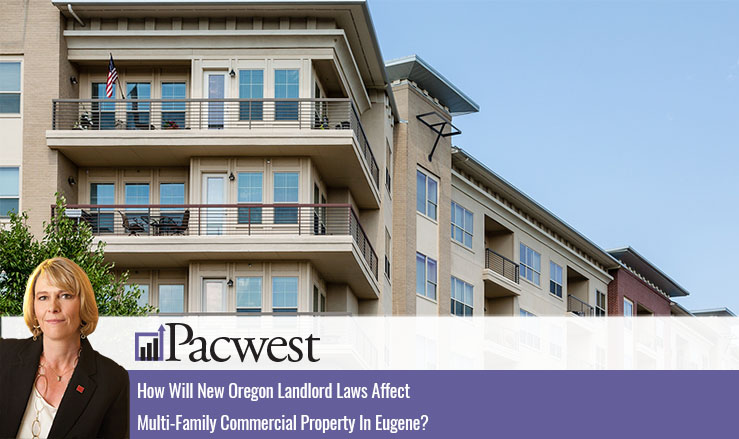
With so much in the news about landlord/tenant law changes, many are wondering how these changes will affect multi-family commercial property in Eugene. In this episode of our popular blogcast series, René outlines what impacts she expects to see.
Listen or Read
Patrick: Today we’re talking with René Nelson, CCIM. A well-known multi-family expert and commercial real estate broker about some recently proposed changes to Oregon, landlord, and tenant laws.
René, how will new Oregon landlord laws affect multi-family commercial property in Eugene?
René Nelson: You know Patrick, historically multi-family buyers have flocked to buy commercial property in Eugene. Our prices are cheaper than Portland. We have a strong tenant pool, and we have a solid employment base here with the university and some other new businesses that are in our area. I think that’s going to change swiftly for all those multi-family buyers that have flocked to us in the past. Here’s how I see it: if an investor is now going to be limited to what he can charge for rent, why wouldn’t he go to another state or a more popular city like Phoenix, Dallas, San Diego, Seattle? Not to mention that there’s really not going to be much motivation for an investor to buy and fix up a property.
Due to the economy of scale, when an investor buys a property to rehab it, they’re going to typically go in and do 25 toilets, 25 showers, 25 kitchen remodels, because it’s just cheaper that way. Now, the government is saying, “Hey, if you do that work, we’re going to control what you can charge for rent.” Really, the only way that an investor would be able to raise rents would be if that tenant moved out and they put a new tenant in, then yes, they would be allowed to raise the rent. As you can see, there’s just a de-motivation. Now the government is going to tell an investor what they could charge for rent, and oh by the way, there’s no motivation to improve the property and make it nicer for the tenants who are living there, because you’re going to be maxed out on what you could charge for rent.
There are proposed limits to rent increases then?
René Nelson: There are. The limits are, you can raise your rent by 5%, but if you exceed and go over 10% and your tenant gives you notice that they’re going to move because of the rent increase, you now have to pay relocation fees, and it’s really expensive. It’s anywhere from $2,500 up to $4,500, depending on the size of the unit.
René, how will out of state investors see that?
René Nelson: I think they’re going to review it as too much risk and not enough reward. I think they’re going to feel that the government is too involved in their business and limiting free market and free opportunity to charge the rent that the market would support. Why wouldn’t they head to other states? I just see that multi-family … We’re going to start to see investors segue out of the market, rather than come in.
Here’s an interesting point that really has not been discussed. In my opinion, it’s a major contributor to what’s happening to the current housing crisis. A law was passed in Oregon on July 1st of 2014, that required all landlords to accommodate Section 8 or housing assistance leases. You can pinpoint to that exact date and time for when rent started to go through the roof as a mechanism for landlords to escape having to rent to Section 8 tenants. In reality, that law has backfired on the intent of helping tenants with housing and it’s created a housing crisis. Now government is saying, “Hey, we’re going to control rent,” and multi-family owners are not happy about it. I think we’re going to see an exit out of the multi-family market and prices are going to be impacted.
And how do you think out of state investors will see that?
René Nelson: I think they’re going to look at it, and I think they’re going to see that there’s too much risk and not enough reward, and they’re going to just say, “I’m not interested in coming to Oregon. I’ll look at some other states,” and I just think that it’s going to hurt overall multi-family values over the next year, because there will be people that I’m already seeing it now, where investors are calling me and saying, “Get me out of my multi-family. I want to move my portfolio to another state.”
Patrick: Thank you, René. If you need more information, go to Eugene-Commercial.com or call René at 541-912-6583.
Whether you’re a local or out-of-state investor, it’s critical to understand what impact changes to these laws will have on your properties. Make plans to regularly follow our blogcasts to ensure you’re up-to-date on everything you need to know!

Recent Comments